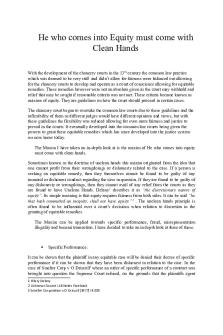Maxim lex non cogit ad impossibilia PDF

| Title | Maxim lex non cogit ad impossibilia |
|---|---|
| Author | Franklin Mbiriri |
| Course | Law of Contract |
| Institution | Rhodes University |
| Pages | 2 |
| File Size | 53.9 KB |
| File Type | |
| Total Downloads | 70 |
| Total Views | 138 |
Summary
Short description of how instances a contract may not be able to be performed due to an instance of impossibility. The instance of impossibility will eventually pass....
Description
maxim lex non cogit ad impossibilia
From what I read, the above maxim applies to instances which are impossible to do and not difficult. I think, Transnet’s case renders it as being difficult but not objectively impossible.
1. Mtokonya v Minister of Police [2017] ZACC 33 para 137 -
According to the maxim lex non cogit ad impossibilia, the law does not require a person to do the impossible. If performance in terms of a particular law has been rendered impossible by circumstances over which the person with interest had no control, those circumstances are taken as a valid excuse for not complying with what such law prescribes.
2. Barkhuizen v Napier 2007 (5) SA 323 (CC) -
For instance, common law does not require people to do that which is impossible. This principle is expressed in the maxim lex non cogit ad impossibilia – no one should be compelled to perform or comply with that which is impossible. This maxim derives from the principles of justice and equity which underlie the common law. Over the years the maxim has become entrenched in our law and has been applied to avoid time bar provisions in statutes.
3. Gassner No V Minister of Law And Order And Others [1995] 1 All SA 223 (C) at 226 -
Suffice it to say that these maxims are related and frequently interlinked in that logic dictates that no one should be compelled to perform or comply with that which is impossible, in the sense of physical, objective impossibility. This must needs emanate from the underlying principles of justice, equity and reasonableness which are suffused throughout our legal system.
4. Strauss v RAF [2007] JOL 19008 (T) at 14
-
Thus, in accordance with the maxim of law lex non cogit ad impossibilia, if it is evident that compliance with the formalities prescribed by a regulation or statute is rendered impossible by circumstances over which the person has no control, then such circumstances will be taken as a valid excuse.
5. “supervening impossibility of performance” in “Workplace Law”, 2009 WPL at 160 and (with reference to Schlengemann v Meyer, Bridgens & Co Ltd 1920 CPD 494):
-
“The maxim ‘lex non cogit ad impossibilia’ applies to all contracts, including contracts of employment. If either party becomes permanently unable to perform his or her obligations under the contract, or is unable to perform those obligations for a period that is unreasonable as far as the other is concerned, the other party is entitled to terminate the contract on the ground of such non-performance.”...
Similar Free PDFs

lex aeterna e lex naturalis
- 4 Pages

Equity - Legal Maxim
- 2 Pages

Maxim Clean Hand Doctrine
- 4 Pages

LEX Ortensia
- 1 Pages

Lex Mercatoria
- 1 Pages

V Lex Global
- 2 Pages

La lex Voconia
- 19 Pages

#17 lex aquilia
- 29 Pages

Practica lex flavia malacitana
- 7 Pages
Popular Institutions
- Tinajero National High School - Annex
- Politeknik Caltex Riau
- Yokohama City University
- SGT University
- University of Al-Qadisiyah
- Divine Word College of Vigan
- Techniek College Rotterdam
- Universidade de Santiago
- Universiti Teknologi MARA Cawangan Johor Kampus Pasir Gudang
- Poltekkes Kemenkes Yogyakarta
- Baguio City National High School
- Colegio san marcos
- preparatoria uno
- Centro de Bachillerato Tecnológico Industrial y de Servicios No. 107
- Dalian Maritime University
- Quang Trung Secondary School
- Colegio Tecnológico en Informática
- Corporación Regional de Educación Superior
- Grupo CEDVA
- Dar Al Uloom University
- Centro de Estudios Preuniversitarios de la Universidad Nacional de Ingeniería
- 上智大学
- Aakash International School, Nuna Majara
- San Felipe Neri Catholic School
- Kang Chiao International School - New Taipei City
- Misamis Occidental National High School
- Institución Educativa Escuela Normal Juan Ladrilleros
- Kolehiyo ng Pantukan
- Batanes State College
- Instituto Continental
- Sekolah Menengah Kejuruan Kesehatan Kaltara (Tarakan)
- Colegio de La Inmaculada Concepcion - Cebu






